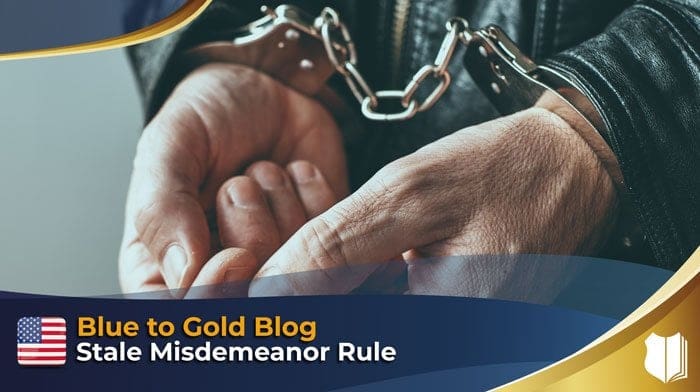

What is the Motor Vehicle Exception?
The automobile, or motor vehicle exception allows officers to search cars for evidence, contraband, and fruits or instrumentalities of crimes without a search warrant. When
or use our live chat
Customer Service


The stale misdemeanor rule is a common law doctrine. It essentially means that a crime was committed within the officer’s presence, and he or she could arrest that person right then and there, but waits, and doesn’t arrest yet. If he then arrests sometime down the road, let’s say on the next day or the next week, courts have held that it is now a stale arrest.
It’s a stale misdemeanor, and the appropriate response is not to arrest them anymore, but to submit a warrant request, or give them a citation and kick them loose.
So first; this stale misdemeanor rule is not really alive in many states. It is alive in California, but it’s very limited.
The idea behind it is that we don’t want this threat of arrest hanging over people’s heads. There was simply a misdemeanor committed in the officer’s presence. Because you have a year and a day, usually to file the charges, we don’t want this hanging over the person’s head forever.
Let’s say you saw a person breaching the peace, like disorderly conduct on a Saturday, and you go up to them and say, “Hey! Knock it off!” Or you don’t do anything. And then, the next week, you see the same guy and you decide to arrest him for that disorderly conduct that happened last week. The courts don’t see that being legitimate for a misdemeanor that you didn’t arrest for before. So, there it is. It’s a very rarely used doctrine in courts.
Let’s apply it to some facts. My officer friend gives the following scenario. The cops investigated a domestic. The husband is not home, he took off on foot, but we have probable cause. So, the officer on that shift writes a PC declaration for the husband, they hand it off to the next shift and say, “Hey, you can go find him. Here you go, here’s the PC declaration, it’s all ready.” The next shift finds him in the next morning, and they arrest him then.
And we go to court. Was that a stale misdemeanor? In my opinion, the answer is “No”. Because one of the issues here is that that particular crime does not have to be committed in the officer’s presence. The state legislature has told cops in California that you can arrest somebody for domestic even if it was never done in your presence. So, I think that gets it around that stale misdemeanor rule from the very beginning.
That’s why I don’t think it’s an issue. So now we do have probable cause and it’s a lawful arrest. He was in a public place, we found him, or we lawfully got into the house or whatever.
I don’t think it’s a problem. So, while arresting, if you found drugs on his person, or a gun, or whatever, I think that evidence is not going to be suppressed on the stale misdemeanor doctrine.
My final point is, if your DA really has a problem with arresting somebody later for a misdemeanor, like a domestic or whatever, they’ll let you know. If it’s not a problem for them, it’s not a problem for you. This issue doesn’t come up very often, so I wouldn’t worry too much about it.
It’s kind of academic in a sense, but it is a very good question, especially in California, because they do have still have the misdemeanor rule.
I hope this helps you. Until next time, my friends stay safe!


The automobile, or motor vehicle exception allows officers to search cars for evidence, contraband, and fruits or instrumentalities of crimes without a search warrant. When


These three golden rules come from reading thousands of court cases over the last 20 years and seeing a theme regarding what the courts are


This question is: Can you look inside a woman’s purse, or a man’s backpack during a pat down? The answer is, “Maybe.” Here’s how this


Here is the question: Can an officer reach slightly into a person’s home to pull them out and arrest them? If an officer has probable
© Blue to Gold, LLC. All rights reserved